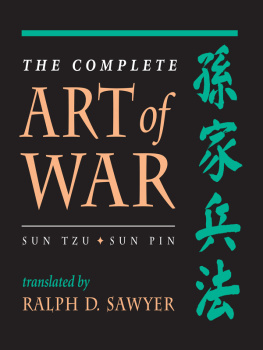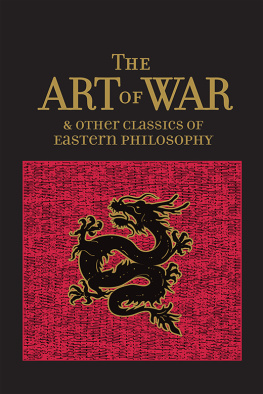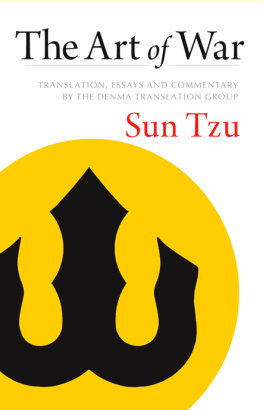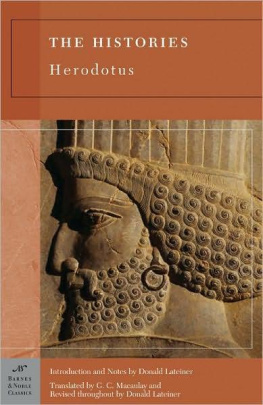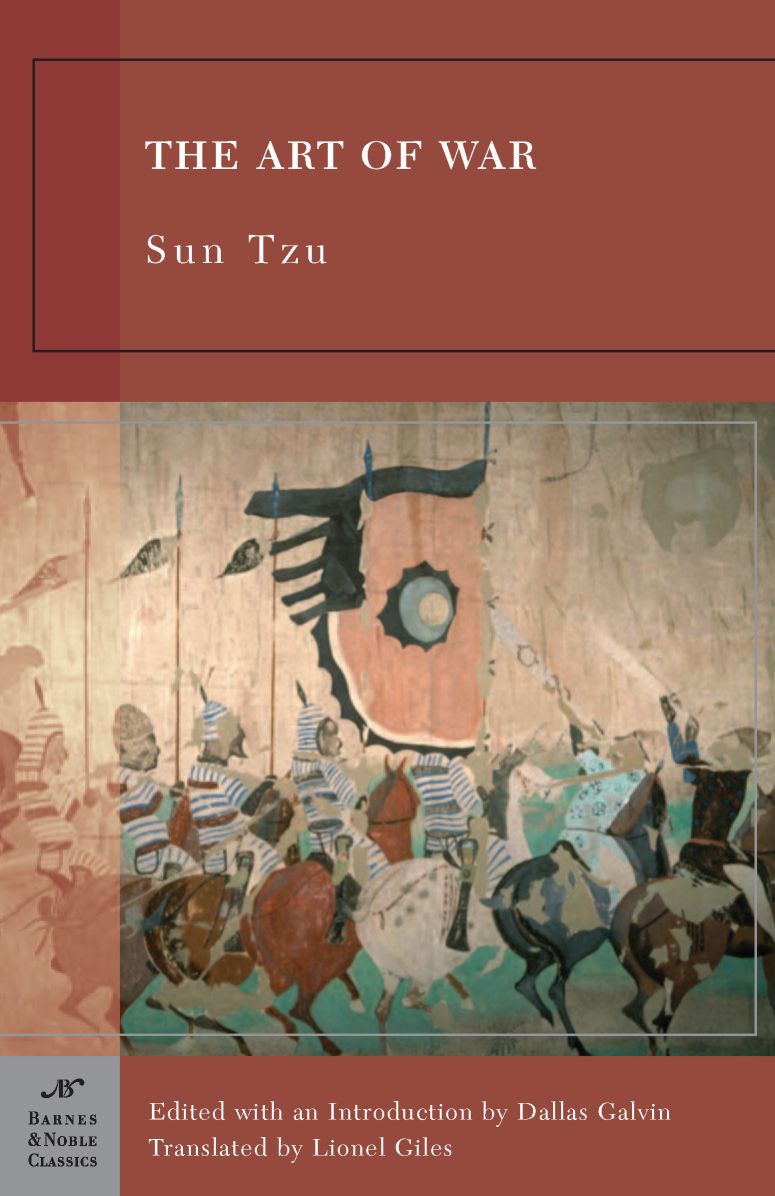
Table of Contents
From the pages of The Art of War
The art of war is of vital importance to the State. It is a matter of life and death, a road either to safety or to ruin. Hence it is a subject of inquiry which can on no account be neglected.
(chapter I, paragraphs 1-2)
All warfare is based on deception.
(chapter I, paragraph 18)
There is no instance of a country having benefited from prolonged warfare.
(chapter II, paragraph 6)
Hence to fight and conquer in all your battles is not supreme excellence; supreme excellence consists in breaking the enemys resistance without fighting.
(chapter III, paragraph 2)
If you know the enemy and know yourself, you need not fear the result of a hundred battles. If you know yourself but not the enemy, for every victory gained you will also suffer a defeat. If you know neither the enemy nor yourself, you will succumb in every battle.
(chapter III, paragraph 18)
We cannot enter into alliances until we are acquainted with the designs of our neighbours.
(chapter VII, paragraph 12)
Rapidity is the essence of war.
(chapter XI, paragraph 19)
If the enemy leaves a door open, you must rush in.
(chapter XI, paragraph 65)
Be subtle! Be subtle! and use your spies for every kind of business.
(chapter XIII, paragraph 18)
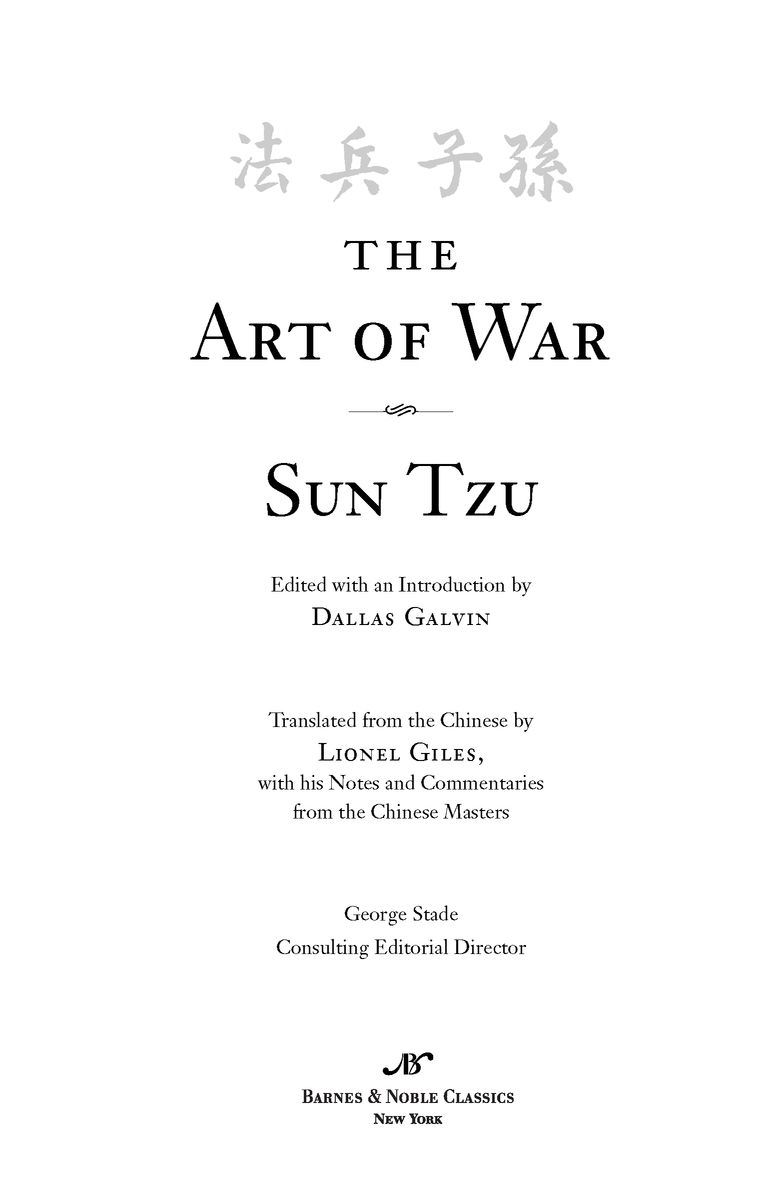
SUN TZU
STRATEGY, ESPIONAGE, DECEPTION, military tacticsthese are the themes elucidated in the ancient Chinese text The Art of War, the indispensable handbook to a subject that has occupied kings and generals for millennia. Little is known about the historical figure of the books author, Sun Tzu. The earliest accounts of his life were written hundreds of years after he died, and the surviving information is clouded by legend.
Thought to have lived in the fifth century B.C., at roughly the same time as Confucius, Sun Tzu was born as Sun WuSun was his family name, Wu his given name, and Tzu an honorific title. His family was part of a clan of experts on arms and fighting; in that era, clans and families owned information, just as in the medieval European guilds fathers passed on specialized knowledge and training to their sons. Sun Tzus teachings are most likely a combination of his clans ideas and his own, as well as concepts associated with early Taoism.
Throughout ancient times, the political and social climate of China was characterized by violent upheaval, the rise and fall of great dynasties, and almost continuous military conflict. Sun Tzu followed the profession of his clan and, on the basis of his growing reputation, entered the service of Ho Lu, king of the state of Wu, as a traveling adviser for hire. His military stratagems intrigued the king, and Sun Tzu eventually became general of the kings army. Employing psychology, deceit, strategic power, and diplomacy as the fundamental arts of combat, Sun Tzu defeated numerous opponents and created a systematic treatise on war.
Military history offers dramatic testimony of Sun Tzus wisdomthe adoption of his methods by the leaders of historys great armies, and the failure of those who disregarded them.
THE WORLD OF SUN TZU AND THE ART OF WAR
c.1700-c.1027 B.C. The Shang Dynasty is the first documented Chinese civilization. Cities are built, and writing and techniques of bronze metallurgy are developed.
c.1027 The Chou Dynasty begins. The golden age of Chinese philosophy, including the works of Confucius and Lao Tze, it will last until 221 B.C. The first part of the Chou Dynasty, known as the Western Chou Dynasty, will last until 772 B.C., when the Chinese rulers are forced east by barbarians from the north; the king is killed, but his son establishes a new capital at Loyang.
The Eastern Chou Dynasty begins; its first part, the Spring and Autumn period, is a time of continuous wars for survival among many small city-states. The Chou emperor steadily loses power as the feudal lords realize he can be beaten, as proved by the defeat in the west. By the end of the Spring and Autumn period (around 481 B.C.) only about a dozen consolidated central states will remain.
685-643 An early state hegemony is established under Duke Huan of Qi. He introduces new state institutions such as taxation, a state-funded army, and state ownership of natural resources; he also establishes an alliance of central states to oppose the power of the large southern kingdom of Chu.
A new hegemony of Jin is established under Duke Wen.
c.551 Confucius is born in the northern state of Lu. Over the course of his life, he rises from a warehouse manager to become one of historys best-known teachers.
The state of Sun, which is bordered by the warring states of Chu and Jin, invites a delegation of eleven states to sign a nonaggression pact. The peace lasts forty years and gives the larger states a reprieve from several hundred years of constant war.
Sun Wu is born in the state of Chi. Later he will be given the honorific title Sun Tzu, meaning Master Sun.
The rule of King Ho Lu of the state of Wu begins.
Sun Tzu enters the service of Ho Lu.
The forty-year peace brokered by the state of Sun in 546 B.C. is broken by the state of Wu, which was not part of the peace agreement.
To defend against marauding barbarians from the north, the northern Chinese states begin building walls that are later connected to form the Great Wall of China.
King Ho Lu dies of wounds sustained in battle. Although Sun Tzus death is never confirmed, it is assumed he did not outlive the king.
Wu gains power and becomes the dominant state in ancient China.
Confucius dies, leaving many followers who spread his teachings about the proper management of society, based on sympathy or human-heartedness.
The state of Wu is defeated by the upstart state of Yue.
c.403 The Eastern Chou Dynastys Warring States period begins; it is characterized by a power struggle between the large states of China, each trying to gain control over the entire area. The Warring States period will last until the end of the Chou Dynasty, about 221 B.C.
c.380 Sun Pin, a descendant of Sun Tzu, is born. Sun Pin is the supposed author of The Lost Art of War, which is considered a companion piece to The Art of War. Sun Pin will achieve great fame as a general, and his writings will build on ideas and tactics found in Sun Tzus seminal work.
221 B.C. China is unified under the harsh rule of Chin Shih Huang-ti. The Chou Dynasty ends and the Chin Dynasty begins. Bureaucratic government is established, and a written language is standardized. Roads and canals are built, as is much of the Great Wall.
The Shih Chi (Historical Records), the first known history of China, is completed. It includes one of two ancient biographies of Sun Tzu.
1st century A.D. The Wu Yueh Chun-chiu appears. It contains a biography of Sun Tzu that details his fabled arrival into the service of King Ho Lu. The Wu Yueh Chun-chiu is entertaining, but it is most likely a romanticized embellishment of the tales found in the Shih Chi.
1772The Art of War is translated into French by Father J. J. Amiot, a Jesuit who learned of Sun Tzu and The Art of War while he was a missionary in China. The translation is probably read by Napoleon.
Next page

